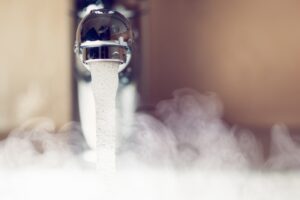 The short answer to this is, “yes.” Why? Because of something called hard water and scaling. You’ve likely heard these terms before, but maybe you didn’t quite understand what they meant. Hard water refers to a water supply that has a large amount of minerals in it—namely calcium, magnesium, and iron. For most people, this is perfectly safe to ingest. But it’s not so great for your plumbing system, including the water heater.
The short answer to this is, “yes.” Why? Because of something called hard water and scaling. You’ve likely heard these terms before, but maybe you didn’t quite understand what they meant. Hard water refers to a water supply that has a large amount of minerals in it—namely calcium, magnesium, and iron. For most people, this is perfectly safe to ingest. But it’s not so great for your plumbing system, including the water heater.
The mineral deposits that get left behind are what result in scaling. Scaling can negatively impact your water heater in worse ways than any other portion of your plumbing system. While you’re able to clean scaling out of a faucet with a wrench and some vinegar, it’s not so easy when it comes to your water heater. Read on to learn more!
How Mineral Deposits Get Left Behind
Have you ever discovered a flaky white, yellow, or greenish buildup around the drains or faucet handles of your sinks or bathtub? This is what scaling results in–the mineral deposits that get left behind due to hard water. The minerals unfortunately do not drain away easily, like water does. Instead, they cling to the metal surface of your pipe lining, even as the water rushes through.
This is how mineral deposits get lodged in and stuck in your plumbing pipes, including those that lead in and out of your water heater. It also results in mineral deposits collecting at the bottom of the tank of your water heater (or inside the tankless system).
The Damage Scaling Does
This hard water scaling impacts your water heater in various ways. For instance, buildup can develop inside your pipes and eventually block water from moving through, if it develops a thick enough layer of mineral deposits.
What’s a bit more common, however, is the damage that occurs to the water heater’s tank. Minerals build at the bottom of the tank, as we just mentioned above, and this makes it hard for water to get heated up evenly. This results in decreased water heater energy efficiency and unbalanced water pressure. The worst part is that the minerals rattle around at the bottom of the tank, which can lead to corrosion.
The Signs of Scaling
Perhaps the most apparent sign of scaling in your water heater is the sound it produces when banging around inside the bottom of your tank. This noise is usually described as a knocking or a popping sound. This happens when steam bubbles try to escape past the layer of sediment that’s settled on the bottom of your water heater.
Scaling can also negatively affect the temperature of the water. This is particularly true with tankless water heater systems, since the deposits coat the heat exchanger and make it harder for the water to pick up heat. You may also notice low water pressure if scaling is clogging the pipes that lead out of your water heater.
What Can You Do?
Schedule routine maintenance for your water heater, regardless of whether you have a tank system or a tankless system! Tankless systems typically need less maintenance, but contacting our professionals is the first step in determining what’s needed for your specific system and water heating needs.
Contact Performance Plumbing for expert service on water heaters in Hazelwood, MO.
